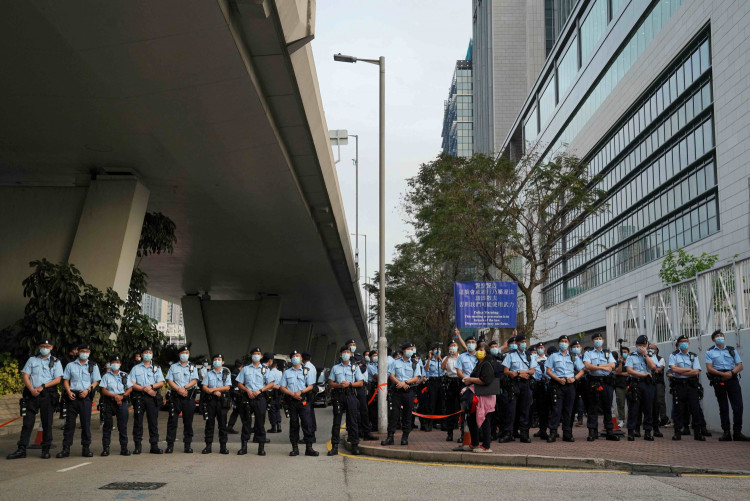A Beijing-backed national security law has given Hong Kongers "extra protection," security minister John Lee Ka-chiu told the United Nations Human Rights Council Monday, hours after a defendant, facing a potential life sentence, fainted during a security law trial called "draconian" by lawyers.
The controversial legislation came into effect last July after more than a year of intermittent violence and protests against mainland Chinese influence over the former British colony, which is guaranteed 50 years of relative autonomy under a 1984 agreement.
Lee praised the security law during a webinar organized by Chinese U.N. representatives in Geneva. "The effect of the law is obvious and direct," he said, pointing to a decrease in violence and public order incidents.
A legislative "vacuum" in Hong Kong needed filling since the city hadn't introduced a local security law of its own since the 1997 handover.
"Stability and order have been restored and people have returned to their normal life," the security minister told diplomats from around the world during the briefing.
Under the law, 99 people have been arrested to date - just "0.001 percent of the population of Hong Kong" according to Lee.
But in just a few months, this has crushed nearly all political opposition in the city and seen many leading activists and lawmakers jailed.
Forty-seven pro-democracy advocates for a second-straight day are on trial for subversion under the security law for organizing an unofficial poll of pan-democrat candidates ahead of the since-cancelled fall elections.
The hearing was adjourned in the early morning hours of Tuesday when one defendant fainted. Clarisse Yeung Suet-ying, Tai Hang neighborhood representative on the Wan Chai District council, collapsed at 1:45 am after nine hours of proceedings and was sent to hospital in an ambulance.
Chief Magistrate Victor So Wai-tak called a recess an hour later and the case resumed Tuesday afternoon.
Prosecutors asked the court to hold the defendants in custody for at least three extra months as the police continue their inquiries into the case, prompting concerns from defense counsel that their clients could be behind bars for years before the actual trial gets underway.
Taking advantage of the security law's strict bail conditions is "draconian," said defense lawyer Edward Chan Tak-cheung.
"On one hand, you are prosecuting at an immature stage, but on the other hand you oppose people's releases," said Civic Party chairman and lawyer Alan Leong Ka-kit Monday. "This is self-contradictory and a serious blow to freedom and human rights."





